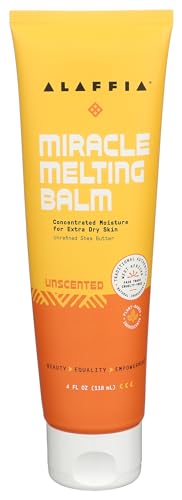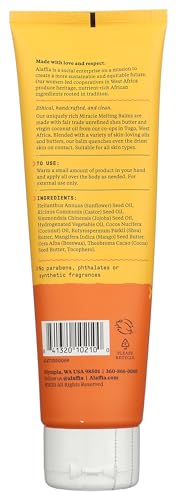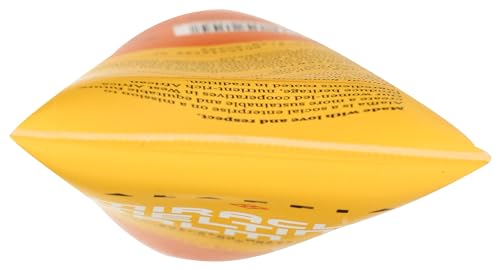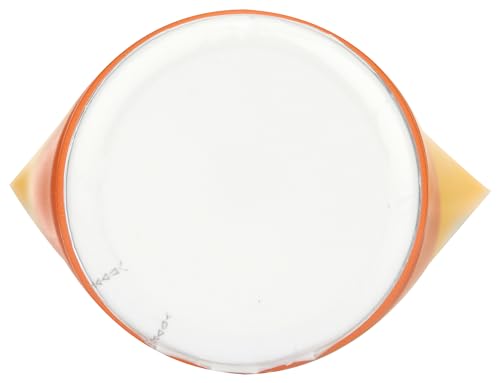





ALAFFIA Body Balm - Nourishing Moisturizer, Certified Organic, Cruelty-Free - 4oz


Ricinus Communis (Castor) Seed Oil
Medium RiskCastor oil is extracted from the seeds of Ricinus communis and is commonly used in cosmetic and personal care products for its moisturizing and emollient properties. It is known for its ability to enhance skin absorption and provide a protective barrier.
Sustai Insights
Castor oil offers functional benefits as a moisturizer and emollient, enhancing skin absorption and providing a barrier against moisture loss. It is sustainably sourced and biodegradable. However, potential health risks include low levels of irritation and moderate concerns regarding developmental and reproductive toxicity. Environmental risks are low, with no significant pollutant or bioaccumulation concerns reported. Regulatory status shows no current restrictions. Overall, the risk level is assessed as medium, with recommendations for safe usage practices, and potential alternatives include other plant-based oils.
Theobroma Cacao (Cocoa) Seed Butter
Low RiskTheobroma cacao (cocoa) seed butter is extracted from the roasted seeds of the cocoa plant. It is commonly used in cosmetics and skincare products for its emollient properties, helping to moisturize and soften the skin. Cocoa butter is also known for its stability and resistance to rancidity.
Sustai Insights
Cocoa butter is recognized for its effective moisturizing properties and is sustainably sourced, contributing to its appeal in personal care products. It poses low health risks, with minimal concerns regarding carcinogenicity, allergies, or reproductive toxicity. Environmentally, it does not significantly contribute to pollution or bioaccumulation. Regulatory bodies impose few restrictions, affirming its safety. Overall, the risk associated with cocoa seed butter is low, making it a favorable ingredient in cosmetics. Alternatives include shea butter or plant oils for similar emollient benefits.
Euphorbia Cerifera (Candelilla) Wax
Low RiskCandelilla wax is extracted from Euphorbia cerifera, a shrub native to northern Mexico and the southwestern United States. It is primarily used as a thickening agent, emollient, and film-forming agent in cosmetic and personal care products.
Sustai Insights
Candelilla wax serves effectively as a natural thickener and emollient, contributing to product texture and moisture retention. It is biodegradable and sourced sustainably, supporting eco-friendly formulations. Health risks are low, with minimal concerns about sensitization. Environmental hazards are also low, with no significant pollutant or bioaccumulation potential noted. Regulatory bodies impose few restrictions, indicating overall low risk. Safe usage practices should be followed, and alternatives like carnauba wax may be considered for those seeking different plant-based options.
Beeswax
Low RiskBeeswax is the purified wax obtained from the honeycomb of honeybees. It is typically used as a thickening agent, emulsifier, or to provide structure in various cosmetic and personal care products.
Sustai Insights
Beeswax offers functional benefits as a natural emulsifier and thickening agent, contributing to product stability and texture. It is biodegradable and sustainably sourced, aligning with eco-friendly practices. Health risks are low, with minimal concerns regarding carcinogenicity, allergies, or irritation. Environmental risks are also low, with no significant pollutant or bioaccumulation issues. Regulatory bodies impose few restrictions, confirming its safety in use. Safe usage practices should be followed, and alternatives like plant-based waxes may be considered for those seeking vegan options. Overall, the risk level associated with beeswax is low.
Caprylic/Capric Triglyceride
Low RiskCaprylic/capric triglyceride is a mixed triester derived from coconut oil and glycerin, primarily used as an emollient and skin-conditioning agent in cosmetic formulations. It serves to improve the texture and spreadability of products while providing a lightweight, non-greasy feel on the skin.
Sustai Insights
Caprylic/capric triglyceride offers functional benefits as an effective emollient, enhancing skin hydration without clogging pores. It is biodegradable, contributing to sustainability. Health risks are low, with minimal concerns regarding carcinogenicity, allergies, or reproductive toxicity. Environmental impacts are also low, with no known pollutant status. Regulatory assessments indicate no current restrictions. Overall, this ingredient presents a low risk profile, making it a safe choice in cosmetic applications.
Cocos Nucifera (Coconut) Oil
Low RiskCocos Nucifera (Coconut) Oil is derived from the kernels of the coconut palm. It is primarily used in cosmetic formulations for its emollient and moisturizing properties, making it suitable for skin and hair care products.
Sustai Insights
Coconut oil serves as an effective moisturizer and emollient, promoting skin hydration and softness. It is sustainably sourced and biodegradable. Health risks are minimal, with low concerns regarding carcinogenicity, allergens, and reproductive toxicity. Environmental impact is also low, as it does not contribute significantly to pollution or bioaccumulation. Regulatory bodies have not issued restrictions on its use. Overall, coconut oil presents a low risk for health and environmental concerns, making it a safe ingredient in cosmetic products.
Butyrospermum Parkii (Shea) Butter
Low RiskButyrospermum parkii (shea) butter is a vegetable fat derived from the nuts of the shea tree. It is commonly used in cosmetic formulations for its emollient properties, providing moisture and improving skin texture. Additionally, shea butter is known for its ability to enhance the stability of products and deliver a creamy texture.
Sustai Insights
Shea butter offers functional benefits as an effective moisturizer, enhancing skin barrier function and texture. It is sustainably sourced and biodegradable, contributing to eco-friendliness. Health-wise, it is associated with low risks for carcinogenicity, allergies, and reproductive toxicity. Environmental impacts are minimal, with no significant pollutant potential identified. Regulatory assessments indicate no current restrictions. Overall, the ingredient presents a low risk, making it a favorable choice in cosmetic formulations.
Simmondsia Chinensis (Jojoba) Seed Oil
Low RiskSimmondsia chinensis (jojoba) seed oil is extracted from the seeds of the jojoba plant. It is commonly used in cosmetics for its moisturizing properties and ability to mimic human sebum, making it beneficial for skin and hair care formulations.
Sustai Insights
Jojoba seed oil offers functional benefits such as effective moisturization and emollience, contributing to skin hydration and smoothness. It is sustainably sourced and biodegradable. Health risks are low, with minimal concerns regarding carcinogenicity, allergies, and reproductive toxicity. Environmental risks are also low, as it does not significantly contribute to pollution or bioaccumulation. Currently, there are no regulatory restrictions on its use. Overall, the risk level is low, and it is considered a safe ingredient with no significant adverse effects.
Theobroma Cacao (Cocoa) Seed Butter
Low RiskTheobroma cacao (cocoa) seed butter is extracted from the roasted seeds of the cocoa plant. It is commonly used in cosmetics and skincare products for its emollient properties, helping to moisturize and soften the skin. Cocoa butter is also known for its stability and resistance to rancidity.
Sustai Insights
Cocoa butter is recognized for its effective moisturizing properties and is sustainably sourced, contributing to its appeal in personal care products. It poses low health risks, with minimal concerns regarding carcinogenicity, allergies, or reproductive toxicity. Environmentally, it does not significantly contribute to pollution or bioaccumulation. Regulatory bodies impose few restrictions, affirming its safety. Overall, the risk associated with cocoa seed butter is low, making it a favorable ingredient in cosmetics. Alternatives include shea butter or plant oils for similar emollient benefits.
Euphorbia Cerifera (Candelilla) Wax
Low RiskCandelilla wax is extracted from Euphorbia cerifera, a shrub native to northern Mexico and the southwestern United States. It is primarily used as a thickening agent, emollient, and film-forming agent in cosmetic and personal care products.
Sustai Insights
Candelilla wax serves effectively as a natural thickener and emollient, contributing to product texture and moisture retention. It is biodegradable and sourced sustainably, supporting eco-friendly formulations. Health risks are low, with minimal concerns about sensitization. Environmental hazards are also low, with no significant pollutant or bioaccumulation potential noted. Regulatory bodies impose few restrictions, indicating overall low risk. Safe usage practices should be followed, and alternatives like carnauba wax may be considered for those seeking different plant-based options.
Beeswax
Low RiskBeeswax is the purified wax obtained from the honeycomb of honeybees. It is typically used as a thickening agent, emulsifier, or to provide structure in various cosmetic and personal care products.
Sustai Insights
Beeswax offers functional benefits as a natural emulsifier and thickening agent, contributing to product stability and texture. It is biodegradable and sustainably sourced, aligning with eco-friendly practices. Health risks are low, with minimal concerns regarding carcinogenicity, allergies, or irritation. Environmental risks are also low, with no significant pollutant or bioaccumulation issues. Regulatory bodies impose few restrictions, confirming its safety in use. Safe usage practices should be followed, and alternatives like plant-based waxes may be considered for those seeking vegan options. Overall, the risk level associated with beeswax is low.
Ricinus Communis (Castor) Seed Oil
Medium RiskCastor oil is extracted from the seeds of Ricinus communis and is commonly used in cosmetic and personal care products for its moisturizing and emollient properties. It is known for its ability to enhance skin absorption and provide a protective barrier.
Sustai Insights
Castor oil offers functional benefits as a moisturizer and emollient, enhancing skin absorption and providing a barrier against moisture loss. It is sustainably sourced and biodegradable. However, potential health risks include low levels of irritation and moderate concerns regarding developmental and reproductive toxicity. Environmental risks are low, with no significant pollutant or bioaccumulation concerns reported. Regulatory status shows no current restrictions. Overall, the risk level is assessed as medium, with recommendations for safe usage practices, and potential alternatives include other plant-based oils.
Caprylic/Capric Triglyceride
Low RiskCaprylic/capric triglyceride is a mixed triester derived from coconut oil and glycerin, primarily used as an emollient and skin-conditioning agent in cosmetic formulations. It serves to improve the texture and spreadability of products while providing a lightweight, non-greasy feel on the skin.
Sustai Insights
Caprylic/capric triglyceride offers functional benefits as an effective emollient, enhancing skin hydration without clogging pores. It is biodegradable, contributing to sustainability. Health risks are low, with minimal concerns regarding carcinogenicity, allergies, or reproductive toxicity. Environmental impacts are also low, with no known pollutant status. Regulatory assessments indicate no current restrictions. Overall, this ingredient presents a low risk profile, making it a safe choice in cosmetic applications.
Cocos Nucifera (Coconut) Oil
Low RiskCocos Nucifera (Coconut) Oil is derived from the kernels of the coconut palm. It is primarily used in cosmetic formulations for its emollient and moisturizing properties, making it suitable for skin and hair care products.
Sustai Insights
Coconut oil serves as an effective moisturizer and emollient, promoting skin hydration and softness. It is sustainably sourced and biodegradable. Health risks are minimal, with low concerns regarding carcinogenicity, allergens, and reproductive toxicity. Environmental impact is also low, as it does not contribute significantly to pollution or bioaccumulation. Regulatory bodies have not issued restrictions on its use. Overall, coconut oil presents a low risk for health and environmental concerns, making it a safe ingredient in cosmetic products.
Butyrospermum Parkii (Shea) Butter
Low RiskButyrospermum parkii (shea) butter is a vegetable fat derived from the nuts of the shea tree. It is commonly used in cosmetic formulations for its emollient properties, providing moisture and improving skin texture. Additionally, shea butter is known for its ability to enhance the stability of products and deliver a creamy texture.
Sustai Insights
Shea butter offers functional benefits as an effective moisturizer, enhancing skin barrier function and texture. It is sustainably sourced and biodegradable, contributing to eco-friendliness. Health-wise, it is associated with low risks for carcinogenicity, allergies, and reproductive toxicity. Environmental impacts are minimal, with no significant pollutant potential identified. Regulatory assessments indicate no current restrictions. Overall, the ingredient presents a low risk, making it a favorable choice in cosmetic formulations.
Simmondsia Chinensis (Jojoba) Seed Oil
Low RiskSimmondsia chinensis (jojoba) seed oil is extracted from the seeds of the jojoba plant. It is commonly used in cosmetics for its moisturizing properties and ability to mimic human sebum, making it beneficial for skin and hair care formulations.
Sustai Insights
Jojoba seed oil offers functional benefits such as effective moisturization and emollience, contributing to skin hydration and smoothness. It is sustainably sourced and biodegradable. Health risks are low, with minimal concerns regarding carcinogenicity, allergies, and reproductive toxicity. Environmental risks are also low, as it does not significantly contribute to pollution or bioaccumulation. Currently, there are no regulatory restrictions on its use. Overall, the risk level is low, and it is considered a safe ingredient with no significant adverse effects.
Experience the nourishing power of ALAFFIA Unscented Melting Miracle Balm, a versatile body balm designed for the environmentally and health-conscious consumer. Crafted with a blend of natural ingredients, this balm provides deep hydration and relief for dry or irritated skin without any added fragrances.
- Deep Hydration: This balm locks in moisture, ensuring your skin stays soft and supple.
- Natural Ingredients: Made with certified organic ingredients, including shea butter and coconut oil, promoting skin health without harmful additives.
- Easy Application: Simply warm the balm in your hands and massage it into the desired area for immediate relief from dryness.
- Cruelty-Free: Committed to ethical practices, ALAFFIA ensures no animal testing is involved in the creation of this product, supporting a compassionate choice for consumers.
- Versatile Use: Ideal for all skin types, this balm is perfect for daily use on elbows, knees, and any other dry patches, providing lasting hydration throughout the day.
Subscribe & Save with Sustai
- Best Price Guarantee: Always enjoy the lowest prices on sustainable home essentials.
- No Surprises: We’ll notify you before shipping. No hidden fees, ever.
- You’re in Charge: Change, pause, or cancel your subscription anytime with ease.
- Eco-Friendly Deliveries: Our grouped shipments mean less packaging and lower emissions.
Join us on a sustainable journey. Special offers for a limited time! Prices and promotions may change.
Recommended Products
Experience the nourishing power of ALAFFIA Unscented Melting Miracle Balm, a versatile body balm designed for the environmentally and health-conscious consumer. Crafted with a blend of natural ingredients, this balm provides deep hydration and relief for dry or irritated skin without any added fragrances.
- Deep Hydration: This balm locks in moisture, ensuring your skin stays soft and supple.
- Natural Ingredients: Made with certified organic ingredients, including shea butter and coconut oil, promoting skin health without harmful additives.
- Easy Application: Simply warm the balm in your hands and massage it into the desired area for immediate relief from dryness.
- Cruelty-Free: Committed to ethical practices, ALAFFIA ensures no animal testing is involved in the creation of this product, supporting a compassionate choice for consumers.
- Versatile Use: Ideal for all skin types, this balm is perfect for daily use on elbows, knees, and any other dry patches, providing lasting hydration throughout the day.

You can have at most 2 Sustainable Steals products in your cart
Customer Reviews
Customers’ View
Customers appreciate the effectiveness and ethical nature of Miracle Balm, highlighting its ability to moisturize without causing irritation. Users report significant relief for dry and sensitive skin, with one customer noting it feels wonderful and does not burn, making it suitable even for the most delicate areas. The product's use of natural, clean ingredients resonates well with environmentally and health-conscious consumers, as it is free from harmful chemicals. Additionally, the commitment to cruelty-free practices and support for fair trade from West Africa underscores the brand's dedication to ethical sourcing. Overall, customers find this body balm to be a reliable solution that aligns with their values of sustainability and health.
AI-generated from the text of customer reviewsThis product has no reviews yet.




